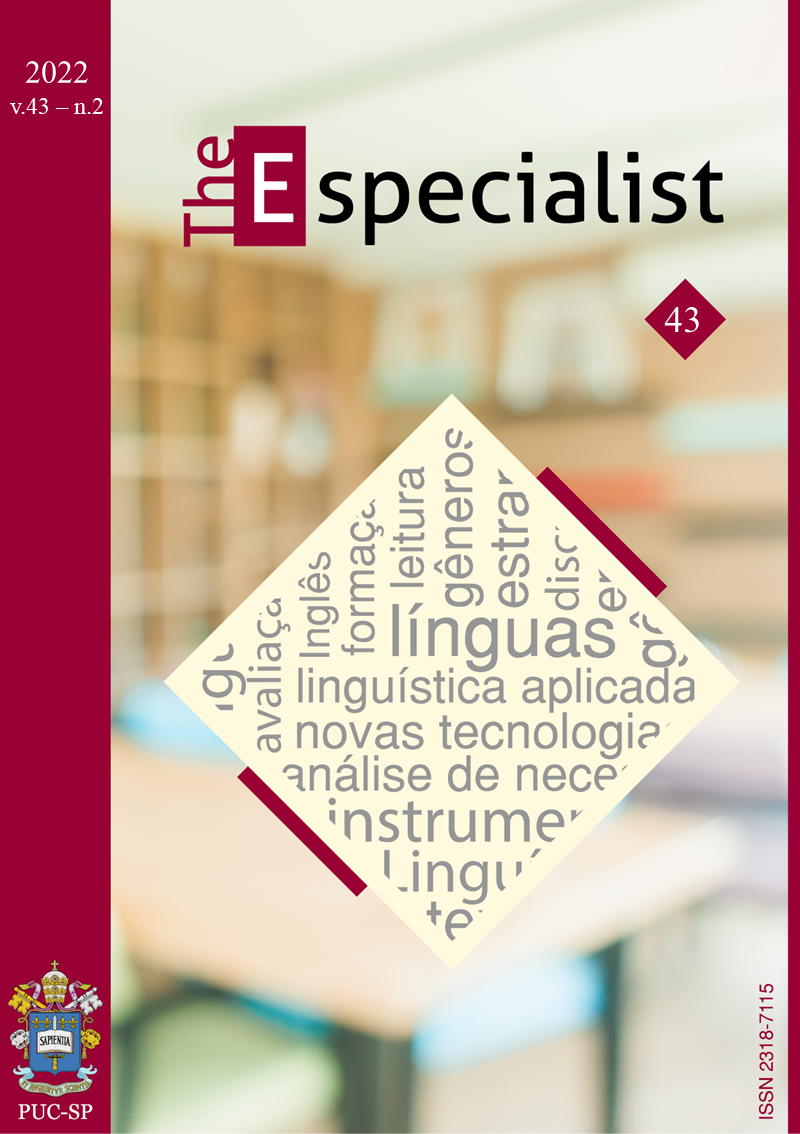Letramentos críticos na formação docente
a função educacional da aula de língua inglesa
DOI:
https://doi.org/10.23925/2318-7115.2022v43i2a6Palavras-chave:
Letramentos críticos; Estágio como pesquisa; Língua inglesa.Resumo
Este artigo discute a importância de uma formação do professor de língua inglesa que focalize o ensino orientado pela perspectiva dos letramentos críticos, por acreditar na contribuição de tal perspectiva para uma sociedade menos violenta e mais humana. Assim, o presente trabalho se baseia na perspectiva teórica mencionada e nas noções de estágio como pesquisa e de componente curricular como meio. A análise focaliza um recorte dos dados de uma pesquisa qualitativa de base etnográfica desenvolvida em nível de mestrado em que estagiárias desenvolvem suas respectivas práticas orientadas pela teoria aqui abordada. Com a análise, observa-se como as noções de estágio como pesquisa e de componente curricular como meio favorecem e potencializam o desenvolvimento de práticas fundamentadas nos letramentos críticos, os quais dão centralidade a questões mais formativas dos sujeitos/alunos situados no contexto investigado.
Referências
ARAÚJO, U. F. 2000. Escola, democracia e a construção de personalidades morais. Educação e Pesquisa, São Paulo, 26.2: 91-107. https://doi.org/10.1590/S1517-97022000000200007
BARROS, W. V. Letramentos digitais: um estudo com a mediação do smartphone no estágio supervisionado de língua inglesa no Ensino Médio. 290f. Dissertação (Mestrado em Linguagem e Ensino). Universidade Federal de Campina Grande, 2019.
CERVETTI, G.; PARDALES, M. J.; DAMICO, J. S. 2001. A tale of differences: comparing the traditions, perspectives and educational goals of critical reading and critical literacy. Reading Online, 4.9: 1-16.
FREIRE, P. 2018. Pedagogia do oprimido. 66ª ed. Rio de Janeiro/São Paulo: Paz e Terra, 253p.
GIROUX, H. A. 1985. Teachers as transformative intellectuals. Social Education, 49.5: 189-197.
JORDÃO, C. M.; FOGAÇA, F. C. 2007. Ensino de Inglês, letramento crítico e cidadania: um triângulo amoroso bem-sucedido. Línguas e Letras, 8.14: 79-105. https://doi.org/10.5935/rl&l.v8i14.906
LUKE, A.; FREEBODY, P. 1997. Shaping the social practices of reading. In: MUSPRATT, S.; LUKE, A.; FREEBODY, P. (Eds.), 1997, Constructing critical literacies. St. Leonards: Hampton, Press, p. 185-225.
MATTOS, A. M. A. 2014. Construindo cidadania nas aulas de inglês: uma proposta para o letramento crítico. In: TAKAKI, N. H.; MACIEL, R. F. (Orgs), 2014, Letramentos em Terra de Paulo Freire. Campinas, SP: Pontes Editores, p. 171 – 191.
MENEZES DE SOUZA, L. M. T. 2011. Para uma redefinição de letramento crítico: conflito e produção de significação. In: MACIEL, R. F.; ARAUJO, V. A. (Orgs.), 2011, Formação de professores de línguas: ampliando perspectivas. Jundiaí: Paco Editorial, p. 128-140.
MENEZES DE SOUZA, L. M. T.; MONTE MÓR, W. Conhecimentos de língua estrangeiras. In: BRASIL. Secretaria de Educação Básica. Orientações curriculares para o ensino médio: Linguagens, códigos e suas tecnologias. Brasília: MEC/SEB, v. 1., 2006, p. 85 – 124.
MONTE-MÓR, W. Crítica e letramentos críticos: reflexões preliminares. 2013. In: ROCHA, C.H.; MACIEL, R. F, 2013, Língua estrangeira e formação cidadã: por entre discursos e práticas. Campinas: Pontes, p. 31-50.
MOREIRA, H.; CALEFFE, L. G. 2008. Metodologia de pesquisa para o professor pesquisador. 2. ed. Rio de Janeiro: Lamparina, 248p.
PIMENTA, S.; ANASTASIOU, L. G. C. 2002. O docente do ensino superior. In: PIMENTA, S.; ANASTASIOU, L. G. C. (Orgs.), 2002, Docência no ensino superior. São Paulo: Cortez, p. 177-200.
TAKAKI, N. H.; FERRAZ, D. M.; MIZAN, S. 2019. Repensando a Educação Linguística com contribuições de Ricoeur e Monte Mór. Pensares em Revista, 1.15: 22-46. https://doi.org/10.12957/pr.2019.38462
Downloads
Publicado
Como Citar
Edição
Seção
Licença
Copyright (c) 2022 The Especialist

Este trabalho está licenciado sob uma licença Creative Commons Attribution 4.0 International License.
Os autores concedem à revista todos os direitos autorais referentes aos trabalhos publicados. Os conceitos emitidos em artigos assinados são de absoluta e exclusiva responsabilidade de seus autores.


 Esta obra está licenciada com uma Licença
Esta obra está licenciada com uma Licença 

